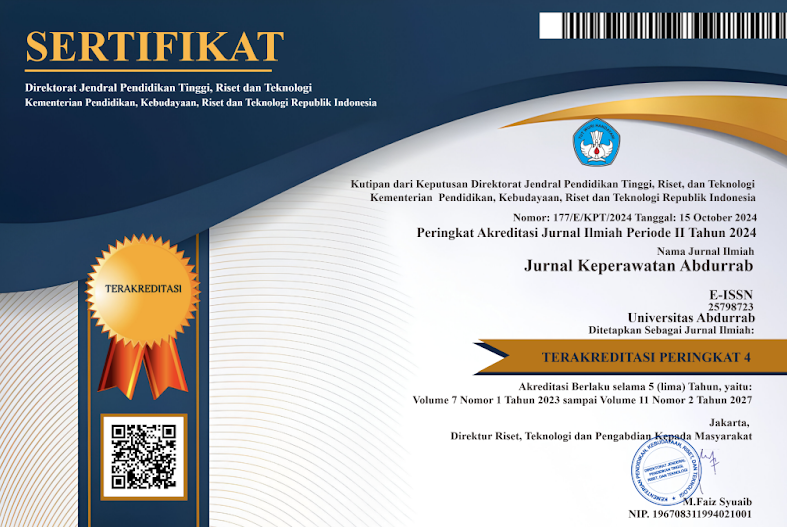FAKTOR-FAKTOR YANG MEMPENGARUHI STATUS GIZI PADA ANAK USIA PRASEKOLAH DI PEKANBARU
DOI:
https://doi.org/10.36341/jka.v7i2.3670Keywords:
Nutritional status, economic status, history of infectious disease, utilization of health services., Status Gizi, status ekonomi, riwayat penyakit infeksi, pemanfaatan pelayanan kesehatan.Abstract
Nutritional status in children is still a major problem, characterized by the increasing incidence of malnutrition and undernutrition in children. To determine whether there is a relationship between factors affecting nutritional status and nutritional status in pre-school children. This study is a quantitative study with a cross-sectional approach. Data collection techniques by distributing questionnaires and observing the measurement of TB and BW of children. The research sample was 100 respondents with purposive sampling technique. Of the 100 respondents, 5-year-old children were 86 respondents (86%), most of them were male as many as 58 respondents (58%), the mother's last level of education was college as many as 42 respondents (42.0%), mothers did not work as many as 59 respondents (59.0%) economic status was less than MSE as many as 67 respondents (67%) nutritional status in children was good nutrition and at risk of overnutrition as many as 55 respondents (55%). The results of the Chi-Square test obtained the results of the associated factors, namely the economic status factor, the results of P value 0.020 <0.05, the factor of history of infectious diseases obtained the results of P value 0.000 <0.05, the health service utilization factor obtained the results of P value 0.000 <0.005. Factors affecting nutritional status in preschool children are economic status, history of infectious diseases and utilization of health services.
Status gizi pada anak masih menjadi masalah utama, yang ditandai dengan kejadian gizi buruk dan kurang pada anak yang terus meningkat. Penelitian ini untuk mengetahui apakah terdapat hubungan antara faktor-faktor yang mempengaruhi status gizi dengan status gizi pada anak usia pra sekolah. Penelitian ini merupakan penelitian kuantitatif dengan pendekatan cross Sectional. Teknik pengumpulan data dengan penyebaran kuisioner dan melakukan observasi pengukuran TB dan BB anak. Sampel penelitian sebanyak 100 responden dengan teknik pengambilan purposive sampling. Dari 100 responden, anak berusia 5 tahun sebanyak 86 responden (86%), sebagian besar berjenis kelamin laki-laki sebanyak 58 responden (58%), tingkat pendidikan terakhir Ibu perguruan tinggi sebanyak 42 responden (42,0%), Ibu tidak bekerja sebanyak 59 responden (59,0%) status ekonomi kurang dari UMK sebanyak 67 responden (67%) status gizi pada anak adalah gizi baik dan beresiko gizi lebih sebanyak 55 responden (55%). Hasil uji Chi-Square didapatkan hasil factor-faktor yang berhubungan dengan status gizi anak prasekolah yaitu pada faktor status ekonomi hasil P value 0,020<0,05, faktor riwayat penyakit infeksi didapatkan hasil P value 0,000<0,05, faktor pemanfaatan pelayanan kesehatan didapatkan hasil P value 0,000<0,005. Fakto-faktor yang mempengaruhi satus gizi pada anak prasekolah adalah status ekonomi, riwayat penyakit infeksi dan pemanfaatan pelayanan kesehatan.
Downloads
Downloads
Published
Issue
Section
License
1. Copyright of all journal manuscripts is held by the Jurnal Keperawatan Abdurrab
2. Formal legal provisions to access digital articles of electronic journal are subject to the provision of the Creative Commons Attribution-ShareAlike license (CC BY-NC-SA), which means that Jurnal Keperawatan Abdurrab is rightful to keep, transfer media/format, manage in the form of databases, maintain, and publish articles.
3. Published manuscripts both printed and electronic are open access for educational, research, and library purposes. Additionally, the editorial board is not responsible for any violations of copyright law.
licensed under a Creative Commons Attribution-ShareAlike 4.0 International License.






